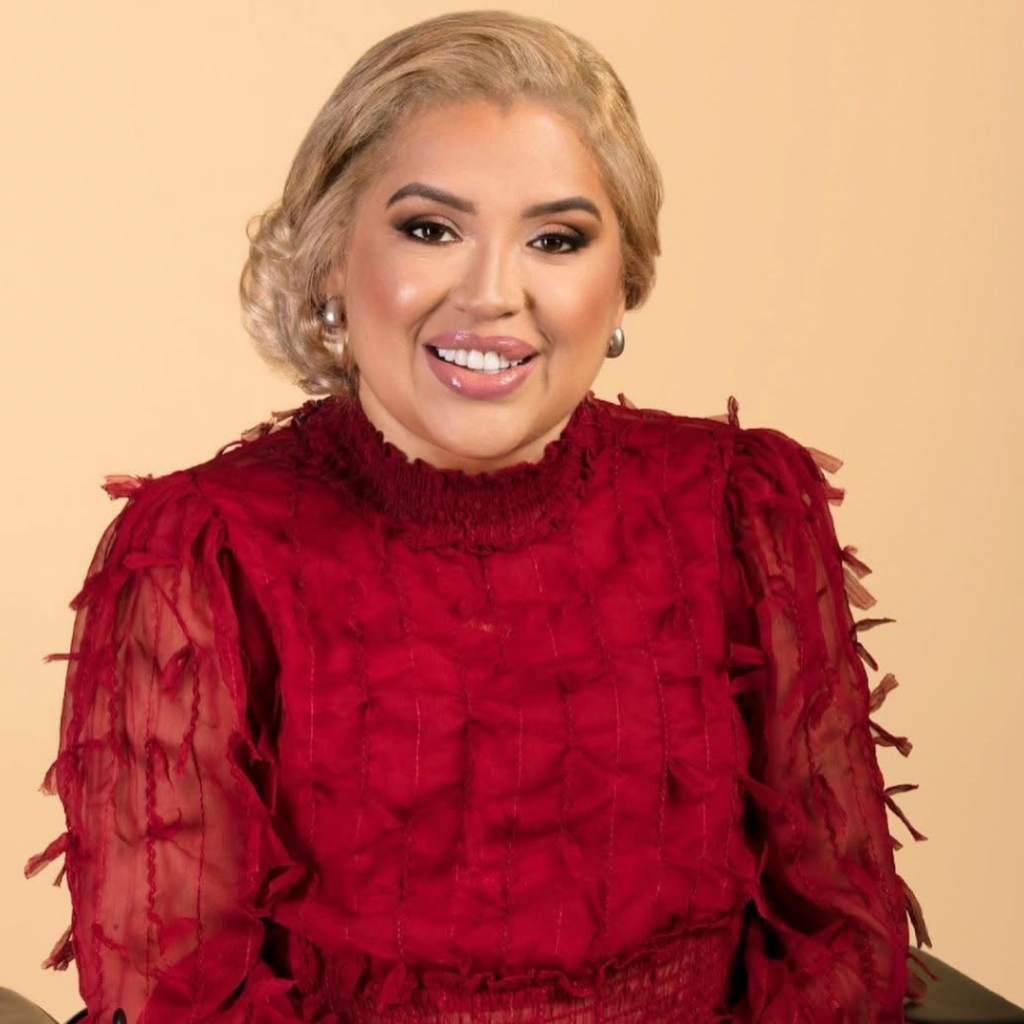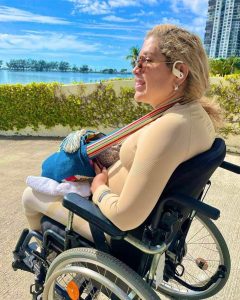← Back to SCI Member Spotlight
Mount Sinai’s Spinal Cord Injury Program Member Spotlight Interview Series features past and present Mount Sinai’s rehabilitation patients and members inspirational stories and life post SCI.

Yesenia Torres
Yesenia Torres is a passionate Disability Advocate, Disability Etiquette and Awareness Trainer, Lecturer, Holistic Life Coach, and Published Author. She is also the founder of the Yesenia Torres Foundation, a nonprofit dedicated to social transformation through love, justice, and solidarity. Guided by four core pillars—empowering women, protecting children’s rights, promoting the well-being of the elderly, and defending animals—her organization creates meaningful programs and initiatives that make a tangible difference in the community.
Despite living with a disability, Yesenia has carved an inspiring path as a speaker, life coach, and activist for people with disabilities in New York, earning recognition and multiple awards for her work. Her book, Destined to Be Reborn, is part of the Against the Horizon series and demonstrates that the only true disability is of the mind and spirit. Written with courage and resilience, it illuminates the power of the human spirit to overcome life’s darkest challenges.
We had the privilege of interviewing Yesenia to hear more about her experiences and insights following her injury, and her story continues to inspire and empower countless individuals in the community.
Garrison Redd (GR): Can you share the story of your injury and how it changed your life?
Yesenia Torres (YT): Thirty years ago, I was in a car accident that left me with a C4–5 incomplete spinal cord injury. Overnight, everything I knew changed. At first, the loss felt overwhelming. But over time, I realized my injury gave me something profound—the chance to rebuild my life with purpose. It became a journey of physical adaptation, spiritual growth, and rediscovery.
GR: What was the biggest adjustment you had to make after your spinal cord injury?
YT: The hardest adjustment was depending on others for basic needs—washing, dressing, or using the bathroom. For someone who valued independence, that was humbling. With time, I came to see dependence not as weakness, but as a way to build trust, connection, and community.
GR: How did your mindset shift from the early days after your injury to now?
YT: In the beginning, I often cried in private, grieving the life I thought I had lost. I felt frustrated and trapped. Today, I see my life differently. This reality opened doors to opportunities I never imagined—to inspire, to serve, and to live with deeper meaning. My injury gave me the gift of purpose and alignment with my mission.
GR: Who or what gave you the most strength during your recovery?
YT: My family and friends gave me the strength to keep going. Their unwavering support carried me through my darkest moments. My spirituality also became vital—it reminded me that faith and hope can carry us further than we ever believed possible.
GR: What’s your relationship with Mount Sinai?
YT: Sinai has become like a second home. Through peer mentoring, speaking engagements, and community programs, I’ve stayed deeply connected. Being part of Sinai allows me to give back while also receiving the invaluable gift of connection with others who understand this journey.
GR: What do you value most about Mount Sinai’s programs?
YT: Sinai gave me a space to grow into my disability. Through volunteering, mentoring, adaptive sports, and community events, I discovered resilience and possibility. More than that, I found a second family within the disability community.
Day-to-Day Living
GR: What’s one daily challenge people might overlook about living with an SCI?
YT: People don’t see the invisible battles—long nights with spasms, fighting to find a comfortable position, or battling insomnia. If I don’t rest well, my entire day is harder. Still, I choose gratitude and determination every morning.
GR: How have you adapted your home environment to make life easier?
YT: My home is equipped with tools that give me independence: an electric bed for transfers, a Hoyer lift for safety, a tub bench for bathing, and Alexa to control lights, music, and calls. These adaptations give me freedom in the ways that matter most.
GR: What piece of adaptive equipment can’t you live without?
YT: My hand brace and L-shaped cuff. With them, I can eat, write, brush my teeth, scratch an itch, and use my computer. They give me daily independence.
GR: How do you care for your physical and mental health each day?
YT: I practice meditation, gratitude, and breathing exercises. I nourish my mind with empowering books and spiritual education, and I keep my body moving through stretching and exercise. Rest is equally important—I honor my body by giving it the sleep it needs.
Community & Advocacy
GR: How important has community support been in your journey?
YT: Invaluable. It encouraged me to try new things, discover resources, and build a purposeful life. Knowing I’m not alone makes all the difference.
GR: What advice would you give to someone newly injured?
YT: Take it one day at a time. It will be hard, but this isn’t the end—it’s the beginning of a new chapter. You have the power to shape it into something meaningful.
GR: Do you think society is becoming more inclusive for people with SCI?
YT: Inclusion is improving. Representation is growing in media, education, and workplaces. But inclusion requires more than visibility—it requires action. We need to ensure change is lived reality, not just symbolism.
GR: What role does advocacy play in improving accessibility?
YT: Advocacy is essential. It’s the voice demanding progress, accessibility, and equality. When we unite as a community, we can influence policy, protect rights, and open doors for the future.
Sports, Fitness & Independence
GR: Have adaptive sports or fitness played a role in your life?
YT: Absolutely. They keep my body strong, prevent deterioration, and bring joy. They also provide connection and remind me that movement—in any form—is empowering.
GR: What does independence mean to you now compared to before?
YT: Before, independence meant doing everything alone. Today, it means having the ability to adapt and live on my own terms. Independence is about being self-sufficient where possible, and interdependent where necessary. Both are strengths.
GR: How do you stay motivated to overcome obstacles?
YT: I remind myself that everything happens for a reason. My accident gave me a second chance. My answer to that gift is to live with purpose, inspire others, and grow continuously.
GR: What goals are you working toward right now?
YT: Personally, I’m nurturing my spirituality and strengthening body and mind. Professionally, I’m expanding my role as a mentor and advocate—helping newly injured individuals see possibility instead of limitation.
Looking Ahead
GR: What changes would you like to see in healthcare for the SCI community?
YT: I’d like healthcare that treats the whole person—not just the injury. That means long-term rehab, personalized care, and equal attention to mental and emotional health. Support shouldn’t end when you leave the hospital.
GR: How do you envision the future for people living with SCI?
YT: A future where accessibility is universal, adaptive technologies are affordable, and people with SCI are fully integrated into every aspect of society. Where we’re valued for what we contribute, not defined by what we lack.
GR: What message would you share with able-bodied people about SCI?
YT: Limitations don’t define our lives. We have the same dreams, ambitions, and joys as anyone else. Approach us with respect and openness—not pity.
GR: What’s one lesson your injury taught you that you wouldn’t trade?
YT: Resilience, gratitude, and living with intention. I’ve learned that life isn’t about perfection or control—it’s about adaptation, growth, and love. That lesson has become my compass, and I wouldn’t trade it for anything.

Follow Yesenia’s journey and buy her new book “DESPITE THE SHADOWS” at @Yeseniatlegacy
